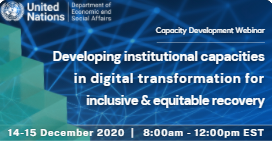
In addition to unleashing unfathomable opportunities for sustainable development, the digital age has also highlighted the vitality of digital solutions allowing societies to function and businesses to continue in the times of COIVD-19 pandemic. Online services and remote working arrangements were among the few of the measures addressing the isolation, keeping people informed and engaged during the COVID-19 response and recovery.
The role of digital government in responding to the pandemic and enabling a more effective recovery has been instrumental in the context of resilient and sustainable development. Digital opportunities, however, come with inherent risks related to digital transformation, stressing the need to address emerging capacity requirements and challenges for digital public policies. Unleashing capacities and strengthening the resilience while mitigating the risks is not only the sole responsibility of governments. It requires the engagement of all stakeholders working as platform and the adoption of more holistic, inclusive approaches that bring together existing initiatives, United Nations entities, regional and sub-regional bodies and other relevant stakeholders that promote digital capacity-building to improve support for Governments and other stakeholders.
This virtual capacity building webinar aimed to strengthen public institutional capacities in public policymaking for digital transformation in support of 2030 Agenda for sustainable development. It aimed to strengthen the digital capacity of countries, especially the developing countries, and in particular the capacity of the LDCs, SIDS, LLDCs, and countries with transition economics, to participate in, and benefit from, the growing opportunities of digitalization while mitigating the risks.
The webinar brought together a network of relevant government officials (CIOs or equivalents), and experts and decision-makers from private sector, civil society, academia in relevant digital fields, including digital government, digital economy, cybersecurity, science, and technology, and innovation (STI).
Participants were invited to share lessons learned, including both success and failure, in address emerging requirements and challenges for policy and decision-making in regard to digital transformation and to reflect on partnerships and digital governance capacity to accelerate recovery and to build a more resilient infrastructure and inclusive service delivery.
How to improve and strengthen the 2022 United Nations E-Government Survey was also discussed during the webinar. Read more
 欢迎来到联合国,您的世界!
欢迎来到联合国,您的世界!